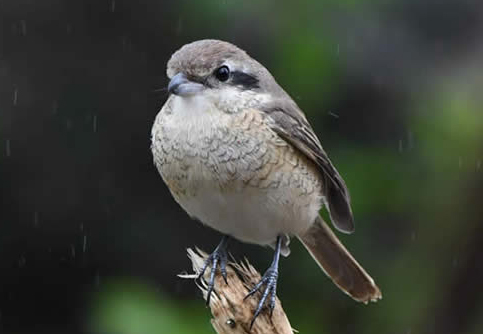I like birds and birding. My wife and I maintain a lot of feeders around our home, which allows us to observe each species in different ways. Over time, we developed relationships with family units that stay here or return each year. This is important to me. I have always felt a deep but respectful connection with creatures in the wild. In this short story/memoir, I experiment with magical realism via a small gray bird.
The photograph is of a Brown Shrike. It was taken by Dr. Callyn Yorke at the Son Tran Mountain wildlife preserve on a rainy day in Da Nang, 2017. (http://avconline.avc.edu/cyorke/Vietnam2017.html)
There is a feel of something distant yet familiar this morning. I take note but do nothing more than the usual weekend routine. Make coffee. Feed cats and dogs.
My night-owl wife gets her best sleep from two until ten, so I leave her a quiet house by taking my cup and our pets out onto the deck. Outside, the air is humid and still. But there’s something else. Mixed in with a Texas spring’s earthy, floral aroma, I detect a faintly salty, petrochemical note.
Taking a sip of coffee, my gaze lands on a bird feeder hanging in the smoky shadows of an Ashe juniper. A chickadee swoops in, grabs a sunflower seed, and hustles back into nearby foliage. There’s no telling how often I have seen that little ritual, but this time it brings a blurry memory into focus.
I recall a Cobra gunship flying so low I could see the pilot’s face. It’s tracing the gentle curve of China Beach, a well-guarded rest and recreation area for American servicemen in Vietnam during the war. Below it, some of my squadron mates are playing shirts and skins football. The rest of us are lounging on the sand, digesting a Fourth of July picnic of grilled steaks, baked beans, and coleslaw.
It’s a typically tropical day for this time of year. Sunny, few clouds, and a reliable breeze from offshore. At our hangar five miles inland, we would be suffering in the stifling, windless heat.
All of sudden, the ocean breeze fades to nothing, and humidity wraps around us like a steaming hot tortilla. This gets everyone’s attention. A tropical thunderstorm will soon blow in.
We pack up and slog across the toasty, coral sand towards the road just beyond a scant tree line. Once there, we watch the senior officers pile into the squadron’s lone pickup truck and drive away. The rest of us have to wait for the scheduled arrival of an olive drab school bus, not due for another hour.
The pickup was barely more than a minute gone when gale-force winds hit hard, toppling a palm tree a little way down the beach.
There are more airmen than can fit under the nearby cabana, so a few of us run to the single remaining wall of a cinderblock structure that’s not far away. We find shelter there just as rain explodes from the sky. The wind is so violent that even with no roof over our heads, we’re somewhat protected in the leeward bubble.
Hunkering down after our mad dash for cover, we notice a little gray bird fluttering vainly against the wind and rain. It looks tired and in physical danger from being repeatedly thrown to the ground by the tempest.
Wordlessly, we edge away from the distressed creature in hopes it will seek refuge in our sanctuary. Suspicious, but not too slow, the bird eases into our pocket of calm.
As we all settle in, I assess our little gathering. It seems that all of us, man and beast, are equals now, quietly watching a furious storm with ancient animal eyes.
After fifteen or twenty minutes, the squall passes. We damp, chilled airmen stir as our shelter mate hops out into the now gentle rain. It swivels its tiny head, carefully looking us over.
The bird’s black eyes sparkle. For a second, I feel at one with it, connected in a way that neither feathers, nor brain size, nor any idea about humanity’s special place in the world can deny.
“Goodbye, my friends,” says an odd voice somewhere inside, “May good weather be yours forever.”
I take a startled breath and hear the young men around me gasp.
Deftly shaking off the rain, the gray bird launches itself up into the air. In a couple of seconds, it disappears into a sky already turning bright and silvery.
My mates and I look at each other. One says, “Did you?” but lets it drop. We tacitly agree that confirming telepathic communication with a bird is a one-way trip to the loony bin.
Yet, we betray not only our own senses but our presumed sanity. When the bus arrives, we climb aboard. We let it take us back into war.
